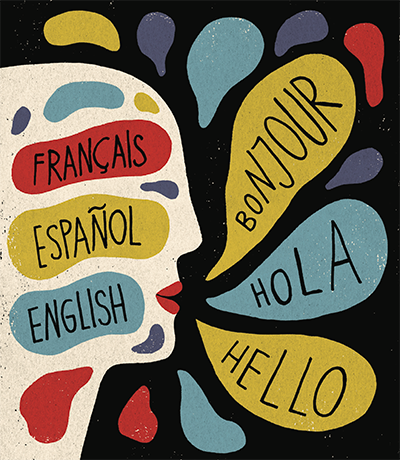Mother Tongue
I’m a polyglot, but not because I ever did anything to deserve it. When people hear that I speak English, French and Spanish, they automatically think that I’m fantastic at learning languages. But the truth is, these languages were handed down to me by my parents: French from my French-Belgian father and Spanish from my Cuban mother. English I inherited from the country of my birth.
Both of my parents are multilingual. My mother by necessity: learning English was her only chance at survival when she landed in New Orleans at the age of 9, leaving the island of her birth without any idea when she might return. (Sixty years later and she still hasn’t stepped foot on Cuban soil.) For my father, wanderlust and adventure fueled his language learning. To a seafaring sailboat captain, collecting languages was par for the course, just another tool in the toolbox.

Although my mother has spent all but the first nine years of her life in English-speaking America, I hear the whisper of Spanish under her breath all the time—when she’s doing a quick calculation in her head or counting off months on her fingers. Enero, febrero, marzo. (When I do something that upsets her, her Spanish comes out, too, but not quite a whisper.)
I never learned Spanish in school, but I received it by osmosis; Miami is a city where one won’t get far without a basic knowledge of the language. My mother’s relatives, the elders of my family, lived within shouting distance of our house and, living in Miami, they never had to fully embrace English. So, Spanish was the default.
And yet I have witnessed the way that language fades in a family of immigrants. Even in a place like Miami that simmers with Spanish at every supermarket and stoplight, I see my elders speak Spanish to their grandchildren, and I see those grandchildren respond in English. Just like that, fluency disappears. And along with it, a crucial cultural key.
It wasn’t until I left my family’s home that I began to appreciate the gift my parents had given me. Being trilingual allowed me access into conversations with strangers around the world, and I cherished these exchanges. It’s only in spending significant time in my husband’s homeland, Germany, that I realized how foreign an experience it is for me to be alienated by language. But it’s in these experiences—sharing jokes with my cousins in Belgium, befriending a quiet woman on a bus across Ecuador, but also being unable to convey my need to a German shopkeeper—that I come to understand the power that language holds. I look forward to the day when I can visit the island of my mother’s birth and listen to the songs and stories of the people who never left.
I’m a mother now, and I’m thinking about the legacy of language that was passed down to me; it feels like a duty that I must not shirk. I want to share this gift with my son, and yet I wonder: What is my mother tongue? What is the language of my dreams? Of my heart? Of my bones?
I speak to my baby in Spanish. I didn’t make a conscious decision to do so, but it’s Spanish that rolls off my tongue as I witness my son’s unfurling into the person he was born to be. Sometimes I worry, when I’m showing him the world, that I can’t remember the word for “ladybug” in Spanish. Out of my three languages, Spanish is the one I command least fluently. My vocabulary isn’t extensive. It’s the language I never learned in school, the one for which I never practiced grammar conjugations. I never even saw it written until I spent a summer in Ecuador as a college student. Am I allowed to bequeath a language that I am still learning?
Unfortunately, my father is no longer around to continue his legacy of “Parle en français” with his grandchildren. But he has left me with the indelible gift of language, one that can never be taken from me. And I know the day will come when I’ll adopt my father’s chant. “Ecoute,” I’ll say. Listen. “Je veux te dire l’histoire de ton grand-père.” I want to tell you the story of your grandfather.
Guiol ghostwrites memoirs and writes a weekly newsletter about digital health, Dispatches from a Digital Life. She is working on her own memoir about caretaking her father, who had early-onset dementia.
Illustration by Hanna Barczyk